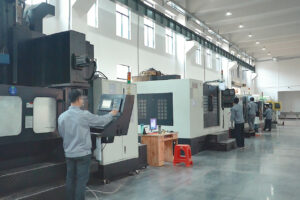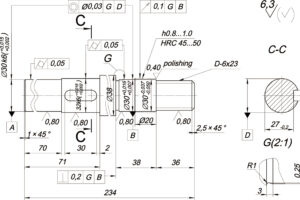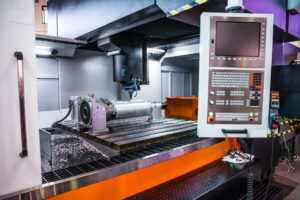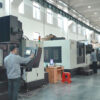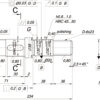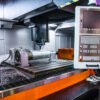The materials for CNC machining are mainly divided into 3 categories, namely metal, non-ferrous gold and non-metallic materials. This article introduces 18 common material options.
Metal material
- Low carbon steel: The carbon content of steel is less than or equal to 0.25%. Due to the low carbon content, it has low strength and hardness but high plasticity, toughness, good forge ability and weldability. Generally, heat treatment is not used, and it is used to manufacture small and medium mechanical parts and molds with low requirements. Such as Q235 (A3) steel and steel profiles commonly used in automation equipment.
- Medium carbon steel: The carbon content of the steel is 0.3%-0.6%, the strength and hardness are high, the cutting performance is good, but the weldability is poor, and it is mainly used for mechanical parts with large loads. Due to the high carbon content, it can be heat treated. 40#, 45#, and 50# sheets of steel are commonly used in equipment shaft parts, which are the most widely used medium carbon steels.
- Stainless steel: Stainless steel is resistant to corrosion by acid and alkaline media and is an alloy steel that is not easy to rust. The commonly used grades in automation equipment are SUS303 and SUS304 (chromium-nickel austenitic stainless steel). 303 has good machinability and can be used as part material. 304 has poor machinability and is often used as sheet metal parts.
- Aluminum alloy 6061: with copper as the primary alloying element, the strength is 470Mpa, heat-resistant, making high-load parts; it is the most commonly used hard aluminium alloy for equipment. Surface treatment commonly uses sandblasting, natural colour, + anodizing.
- Aluminum alloy 6063: with magnesium and silicon as the main alloying elements, the strength is less than 200Mpa. It is a common material for industrial aluminium profiles.
Non-ferrous metal alloys
- Bearing alloy: (referred to as babbitt alloy) is an alloy of copper, tin, lead and antimony. It has good anti-friction, thermal conductivity and anti-glue properties but has low strength and is expensive. It is mainly used to make bearing linings for sliding bearings.
- Cupronickel: A copper-alloy with nickel as the main additive element. Industrial cupronickel is divided into two categories: structural cupronickel and electrical cupronickel. Among them, the structural cupronickel has good mechanical properties and can be used to manufacture precision machinery.
- Brass: Brass is an alloy of copper and tin. It has good plasticity and fluidity and can be rolled and cast for various mechanical parts.
- Bronze: It is divided into two categories: tin bronze and Wuxi copper, which have good anti-friction and corrosion resistance.
non-metallic material
- Rubber: Rubber is elastic and has good cushioning, vibration reduction, heat resistance, insulation and other properties. It is often used to make couplings and shock absorbers.
- Plastics: Plastics are the earliest, fastest-growing and most widely used materials in the synthetic polymer material industry. The specific gravity of plastic is small, and it is easy to make parts with complex shapes; various plastics have different characteristics, such as corrosion resistance, friction and wear resistance, thermal insulation and vibration resistance. Common plastics include polyvinyl chloride, polyolefin polystyrene, phenolic and aminoplast. Engineering plastics have polyoxymethylene, tetrafluoride, polyamine, carbonate, ABS, nylon NC nylon, hydrogenated polyether, etc. Recently, some gears, wheels, rolling bearing cages and bushings of sliding bearings are made of plastic.
- Ceramics: Ceramic materials have a high melting point and good chemical stability at high temperatures, making them suitable for high-temperature materials. Generally, the temperature limit for superalloys is 950~11007, and the temperature limit for ceramic materials is 1200-1600℃. Therefore, using ceramic materials in modern mechanical devices, especially high-temperature mechanical parts, will be a heavy research direction. In addition, high-strength materials have the characteristics of small friction coefficient, resistance to tan, chemical corrosion in the rain, small specific gravity and small linear expansion coefficient so that they can be used in the fields of high temperature, medium temperature, low temperature and precision machining of mechanical parts.
- Polyoxymethylene POM: natural colour white, high strength, rigidity, good elasticity, good wear resistance and wear resistance. Automation equipment is often used for structures with a small force and requiring lightweight, such as jigs and blocks for product positioning.
- Nylon: The natural colour is ivory, not similar to POM, and it is also a commonly used engineering plastic.
- Polyurethane PU: code name PU, of which polyurethane elastomer is a common material for equipment, because of its excellent elasticity, it is often used as a buffer material in kits. Most of the glue on the slow roller is also a polyurethane material. Depending on the situation, the hardness of the chosen elastomer varies.
- Polymethyl methacrylate: codenamed PMMA, commonly known as plexiglass and acrylic. Widely used transparent plastic, often used as a protective cover for equipment safety doors, etc.
- Polytetrafluoroethylene: codenamed PTFE, commonly known as Teflon. It has excellent chemical stability, corrosion resistance, sealing, high lubrication and non-stickiness. Equipment is often used as friction sliding material, seals and anti-adhesive parts.
- Bakelite Bakelite: Phenolic is like wood with high insulation and good plasticity. It is not deformed by heat, has a specific mechanical strength, is easy to process, and has good insulation. It is often used as a fixture for product positioning, a stopper, and material for testing tooling.


